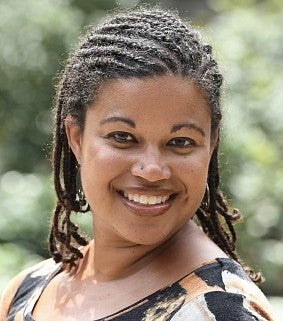
University of Oregon Alumna Jennifer M. Gómez, assistant professor in the Clinical Practice department at Boston University School of Social Work and PhD '17 (clinical psychology), was recently awarded the 2024 International Society for the Study of Trauma and Dissociation (ISSTD) Frank W. Putnam Outstanding Book Award for her new book, The Cultural Betrayal of Black Women and Girls: A Black Feminist Approach to Healing from Sexual Abuse.
The ISSTD Putnam Award is presented to "an outstanding book that significantly contributes to our knowledge and understanding in the field of trauma and dissociation."
Gómez first proposed cultural betrayal trauma theory in 2012, during her time at UO, with support and empowerment from her mentor and graduate advisor, Professor Emerit Jennifer J. Freyd. Since graduating, she has continued to build the research base for this theory – research that has been cited over 600 times.
Her award-winning book greatly expands on her dissertation scholarship, connecting cultural betrayal trauma theory to transdisciplinary research on such topics as intersectional oppression, culturally competent trauma therapy, and radical healing in the Black community.
"Centering Black women and girls and our experiences of sexual abuse, I was able to cover so much material by pulling from a multitude of disciplines, including psychology, social work, sociology, law, anthropology, political science, philosophy, and Black feminist scholarship," said Gómez.
In addition to winning the Putnam award, Gómez’s book is being integrated into graduate course curricula at the Boston University School of Social Work. Her research is further influencing the next generation of scholars, as evidenced by the PhD student-organized panel – "Elucidating Cultural & Institutional Betrayal through Psychological Science" – at the 2024 Society for the Psychological Study of Social Issues Annual Conference, which, along with Gómez, featured their own cultural betrayal research on colorism (Gina Sissoko), DEI efforts at the university (Akanksha Das), and university response to racial justice advocates (Christin Mujica). But this work isn’t just for those within academia; Gómez wants her book to educate and empower all readers.
"It is true that we have simply inherited the world in which we live. Though we did not create this world, we do have the responsibility and the power to work to change our collective life circumstances for the better," Gómez said.
—Ashly Lilly, MNM ’23, is the communications coordinator for the Division of Graduate Studies.
